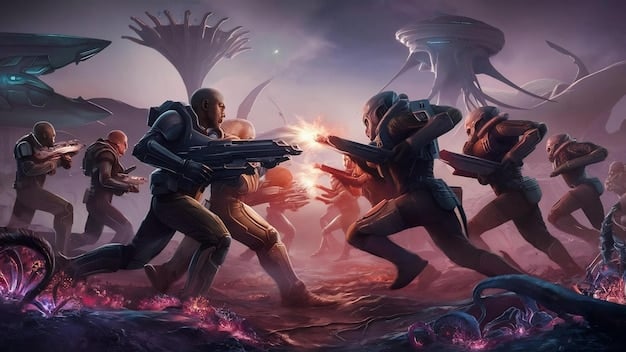Patch 14.25: Impact of Objective Bounties on US Comeback Mechanics

Patch 14.25’s adjustments to objective bounties in League of Legends significantly alter comeback mechanics in the US competitive scene by dynamically rewarding teams who are behind, fostering more strategic gameplay and potentially leading to more exciting and unpredictable matches.
In Patch 14.25 Analysis: How Will the Adjustments to Objective Bounties Affect Comeback Mechanics in US?, we delve into how this patch reshapes the dynamics of League of Legends matches, especially concerning how teams can recover from early deficits in the US region’s competitive landscape.
Understanding Objective Bounties in League of Legends
Objective bounties are a mechanic designed to give losing teams a chance to catch up by providing bonus gold for taking objectives. The system activates when a team falls far enough behind in gold, granting extra rewards for taking down towers, dragons, and Baron Nashor. Patch 14.25 introduces adjustments aiming to refine this system and its impact on game outcomes.
How Objective Bounties Work
Objective bounties trigger when one team is significantly behind in gold. The bounty values scale based on the gold deficit, incentivizing the losing team to coordinate objective takes. When a team with bounties claims an objective, the bonus gold is distributed among the team members.
The Original Intent of Objective Bounties
Riot Games implemented objective bounties to prevent snowballing and extend the game length, allowing for more strategic plays. The goal was to foster more competitive matches by giving underdogs a fighting chance, rather than matches being decisively over after the early game.
- Prevent early game domination from being insurmountable.
- Encourage strategic objective control and team coordination.
- Create opportunities for exciting comebacks.
The introduction of objective bounties aimed to create a more balanced playing field. By offering a gold boost to teams lagging behind, the system sought to discourage early-game snowballs and encourage strategic comebacks. This adjustment impacted the strategic depth of League of Legends matches, particularly in North America, where the competitive scene often sees innovative gameplay.

Key Changes in Patch 14.25
Patch 14.25 brings specific adjustments to the objective bounty system, impacting how these bounties are calculated and distributed. These changes are designed to address some of the perceived issues with the previous iterations of the system, such as inconsistent reward distribution and overly aggressive snowballing.
Adjustments to Bounty Calculation
The patch introduces changes to how the gold deficit is calculated to determine when objective bounties are activated. This ensures the bounties trigger more accurately, reflecting the real state of the game. Some factors that may be considered could be overall team gold difference, tower advantages, and objective control.
Changes to Gold Distribution
The way bonus gold is distributed among the team members has also been tweaked. This is to address concerns about individual players becoming disproportionately strong after a single objective take. The changes might include distributing more gold to support roles or spreading it evenly across the team.
Patch 14.25’s modifications aim to fine-tune objective bounties, ensuring that these mechanics effectively promote comebacks without skewing the game’s balance. The gold distribution changes are particularly significant, as they affect which team members benefit most from a successful objective take. These adjustments are likely to impact team strategies and decision-making, especially in the high-stakes environment of US competitive play.
Impact on Comeback Mechanics in the US Region
The US region, known for its strategic and often innovative gameplay, is expected to see significant effects from the objective bounty adjustments in Patch 14.25. These changes will influence how teams approach games from both winning and losing positions.
How Teams Will Adapt
Teams will need to reassess their strategies around objective control. Winning teams will be more cautious about extending their lead too aggressively, while losing teams will focus heavily on securing bounty objectives. This requires a deeper understanding of timing, coordination, and risk assessment.
Potential Shifts in Meta
The meta could shift as teams experiment with new compositions and strategies that capitalize on the bounty system. We might see the rise of “bounty hunting” compositions designed specifically to take advantage of these comeback mechanics. This could involve champions with strong objective control or high mobility.
- Increased focus on mid to late-game objective control.
- The emergence of new team compositions optimized for comeback potential.
- Greater emphasis on vision control and map awareness.
The US region’s competitive landscape will likely see a strategic evolution as teams adjust to the new objective bounty dynamics. The changes could lead to more varied and engaging matches, as teams are incentivized to innovate and adapt their playstyles. This could ultimately enhance the viewing experience for fans and create a more competitive and dynamic environment.
Analyzing Champion Win Rates
Examining champion win rates after Patch 14.25 can provide valuable insights into how the objective bounty adjustments affect different champions. Some champions may benefit more from the changes than others, depending on their strengths and weaknesses.
Identifying Beneficiary Champions
Champions who excel at objective control, split pushing, or team fighting in the mid to late game are likely to see an increase in their win rates. These champions can capitalize on objective bounties to swing the game in their favor, especially if they can quickly secure objectives while the enemy team is distracted.
Underperforming Champions
Conversely, champions who rely on early-game snowballing may struggle in Patch 14.25. If their lead is not decisive enough, objective bounties can allow the enemy team to catch up, negating their early advantage. This could lead to a decrease in win rates for such champions.

Analyzing champion win rates provides crucial data for understanding the meta shifts caused by the patch. Identifying which champions benefit or suffer from the objective bounty adjustments can help players and teams refine their strategies, optimizing their champion selections to maximize their chances of success. This data will become increasingly important in the US competitive scene as teams adapt to the new dynamics.
Strategic Implications for Professional Play
The alterations to objective bounties in Patch 14.25 are set to heavily influence strategic choices in professional League of Legends matches, especially in the US region. Teams will need to develop sophisticated strategies to navigate the updated system effectively.
Drafting Strategies
Drafting phase will be greatly affected, as teams must now consider not only their team composition’s strength in early versus late game, but also its proficiency at taking objectives under pressure. Champions that can quickly secure objectives or efficiently defend them will be highly valued.
In-Game Decision Making
In-game, teams face modified risk-reward assessments. A team with a lead must choose between pressing their advantage and potentially triggering objective bounties, versus playing cautiously to maintain control while minimizing risks. Decision-making will have to hinge on calculating the precise value of each objective’s bounty relative to the potential cost of contesting it.
Professional League of Legends teams in the US will be compelled to rethink their strategic approaches. Drafting, in-game tactics, and objective prioritization will all need to be carefully calibrated in light of the balance changes. As teams become more proficient at leveraging or neutralizing objective bounties, matches are likely to become even more strategically dense and compelling to watch.
Community and Player Reactions
Community and player reception to Patch 14.25’s objective bounty changes will greatly impact the way the patch is perceived and how rapidly strategies adapt. Understanding community feedback provides insights into the actual success of the modifications.
Initial Reactions
Preliminary reactions are mixed, with some players applauding the intention to balance the game while others voice concerns about the adjustments’ actual efficacy. Some may argue the changes favor particular styles of play or certain champions unduly, while others might suggest the adjustments don’t go far enough to level the playing field.
Impact on Player Behavior
The long run impact on player behaviour will be the last test for Patch 14.25’s objective bounty adjustments. Will the changes guide to more strategic gameplay and more comebacks, or will they prove too complicated or inconsequential to adapt gameplay meaningfully? Observing how gamers change their strategies over weeks to months after the patch is essential.
| Key Point | Brief Description |
|---|---|
| 🎯 Bounty Activation | Gold difference thresholds adjusted for earlier bounty activation. |
| 💰 Gold Distribution | Modified to prevent single players snowballing too hard. |
| 🏆 Strategic Shifts | Teams readjust objective control and drafting tactics. |
| 📈 Win Rates | Champions with objective control see potential increases. |
FAQ
▼
Objective bounties are a comeback mechanic that grants bonus gold to losing teams for taking objectives like towers, dragons, and Baron Nashor, helping them catch up in the game.
▼
Patch 14.25 adjusts how objective bounties are calculated and distributed, aiming for more consistent rewards and preventing individual players from becoming overly strong.
▼
US teams will need to adapt their strategies around objective control and drafting, potentially leading to new team compositions and a greater emphasis on mid-to-late game plays.
▼
Champions who excel at objective control, split pushing, or team fighting in the mid-to-late game are likely to see increased success due to the adjusted bounties.
▼
Professional teams will need to rethink their drafting, in-game tactics, and objective prioritization, carefully assessing the risk-reward ratio of securing objectives while bounties are active.
Conclusion
In summary, Patch 14.25’s adjustments to objective bounties promise to reshape comeback mechanics within League of Legends, particularly in the US region. These changes necessitate strategic adaptations from both professional teams and individual players, potentially leading to dynamic shifts in gameplay and champion viability.
Read more content





